
Pancho & Lefty by Townes Van Zandt (1972) became well-known through a honky tonk album by outlaw country musicians Merle Haggard and Willie Nelson, released in 1983. Original vinyl copies from 1983 give the album's title as "Poncho & Lefty" on the cover, as well as on the inner sleeve and the record label; the album's title track is similarly rendered "Poncho & Lefty" on the cover, inner sleeve, and label. Later editions correct the title to the intended "Pancho & Lefty.” They are backed by Don Markham of The Strangers.

12 Golden Country Greats is the fifth studio album by the American rock band Ween, and their third on Elektra Records. It is the only album on which the group limited themselves to a specific genre of music.
Milton Sims "Mickey" Newbury Jr. was an American singer-songwriter and a member of the Nashville Songwriters Hall of Fame.

Larry Wayne Gatlin is an American country and Southern gospel singer-songwriter. As part of the Gatlin Brothers trio that included his younger brothers Steve and Rudy, he achieved considerable success within the country music genre, performing on 33 top 40 country singles, a total inclusive of his recordings as a solo artist and with the group.
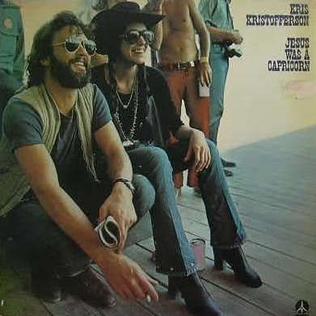
Jesus Was a Capricorn is the fourth album by Kris Kristofferson, released in 1972 on Monument Records. The album cover pictures Kristofferson and his soon-to-be wife Rita Coolidge. "Why Me" reached #1 on the Country singles charts.

Waylon is a studio album by American country music artist Waylon Jennings, released in 1970 on RCA Victor.

Wanted! The Outlaws is a compilation album by Waylon Jennings, Willie Nelson, Jessi Colter, and Tompall Glaser, released by RCA Records in 1976. The album consists of previously released material with four new songs. Released to capitalize on the new outlaw country movement, Wanted! The Outlaws earned its place in music history by becoming the first country album to be platinum-certified, reaching sales of one million.

WWII is a duet album by Waylon Jennings and Willie Nelson, released on RCA Victor in 1982.

Black on Black is a studio album by American country music artist Waylon Jennings, released on RCA Victor in 1982.

Renegade Picker is the fourth album by pioneer Country rock musician Steve Young, this album moves toward the Outlaw Country sound. The album contains his song "Lonesome, On'ry and Mean", that became a hit for fellow outlaw Waylon Jennings.
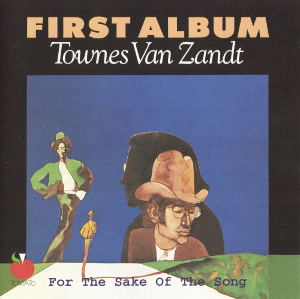
For the Sake of the Song is the debut album by country singer/songwriter Townes Van Zandt, released in 1968. The majority of the songs, including the title track, "Tecumseh Valley", "(Quicksilver Daydreams of) Maria", "Waitin' Around to Die", and "Sad Cinderella", were re-recorded in more stripped-down versions for subsequent studio albums.

The Mysterious Rhinestone Cowboy is the third album of American singer David Allan Coe, and his first on Columbia Records. Released in 1974, it is his first release in the country music genre.

Tattoo is an album released by country musician David Allan Coe, released in 1977 on Columbia Records.

Good Times is the eighth studio album by American country music singer Willie Nelson, released in 1968. Arrangements were by Anita Kerr, Bill Walker and Ray Stevens.

Looks Like Rain is a 1969 concept album by singer-songwriter Mickey Newbury. After recording his debut album with RCA, Newbury was dissatisfied with the resulting album and left RCA to pursue a style closer to his tastes. Recorded at Cinderella Sound, as his next two albums would be, the result is widely considered his first real recording and represents a peak in the singer songwriter movement, especially for Nashville. The sound and style of the record would be highly influential during the Outlaw Movement during country music in the 1970s especially on albums by David Allan Coe and Waylon Jennings. Linking the tracks with delicate arrangements and liberal amount of atmosphere, the record contains some of Newbury's most celebrated compositions including "She Even Woke Me Up to Say Goodbye", "33rd of August", "I Don't Think Much About Her No More", and "San Francisco Mabel Joy". AllMusic's review of the album concludes, "Looks Like Rain is so fine, so mysterious in its pace, dimension, quark strangeness and charm, it defies any attempt at strict categorization or criticism; a rare work of genius."

The Mickey Newbury Collection collects the ten albums Mickey Newbury released on three labels between 1969 and 1981 on an eight disc set. The set was released and is available through Mountain Retreat, a label run by Newbury and later Newbury's family. While Newbury had an impressive reputation as an artist and songwriter, at the time of the set's release in 1998, these recordings had been out of print for years. The original master tapes were lost by the labels, and so the recordings on the collection are digital transfers from virgin vinyl copies. The packaging replicates the original album art.
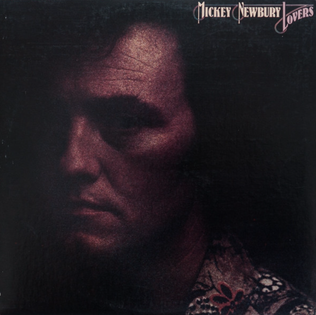
Lovers is the 1975 album by singer-songwriter Mickey Newbury. The album is noted for the inclusion of the epic trilogy "Apples Dipped In Candy" and the title track. It was his final release on Elektra Records. Chet Atkins played guitar on "Apples Dipped in Candy" and Bergen White arranged the strings on the album.
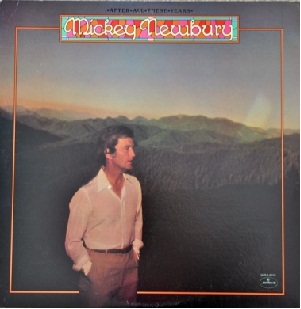
After All These Years is the 1981 album by singer-songwriter Mickey Newbury. Considered the concluding album of his remarkable 1970s run, it was the last album he would record for seven years. The album is very different in tone from its predecessor and revives Newbury's talent for song suites with "The Sailor/Song of Sorrow/Let's Say Goodbye One More Time". Other highlights on the album include "That Was The Way It Was Then" and "Over the Mountain".
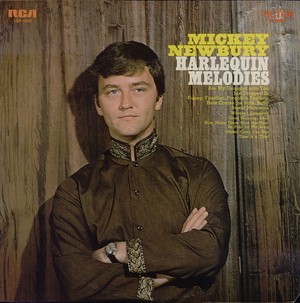
Harlequin Melodies is the 1968 debut album by singer-songwriter Mickey Newbury. Newbury was already a successful songwriter in Nashville, signed by Acuff-Rose Publishing. At one point he had four #1 hits on different charts for Eddy Arnold, Solomon Burke, The First Edition, and Andy Williams, and he had written hits for several others. Produced by Elvis Presley producer Felton Jarvis, Harlequin Melodies concentrates on Newbury's versions of his hit songs; nearly every song on the album has been covered by other artists.
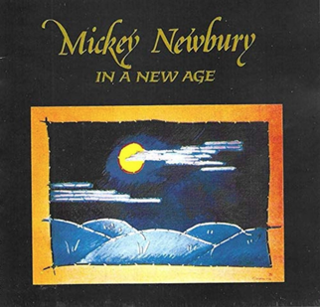
In a New Age is a 1988 album by the singer-songwriter Mickey Newbury. It contains new versions of eight classic Newbury songs, with a full version of "All My Trials" which is part of Newbury's "An American Trilogy"



















